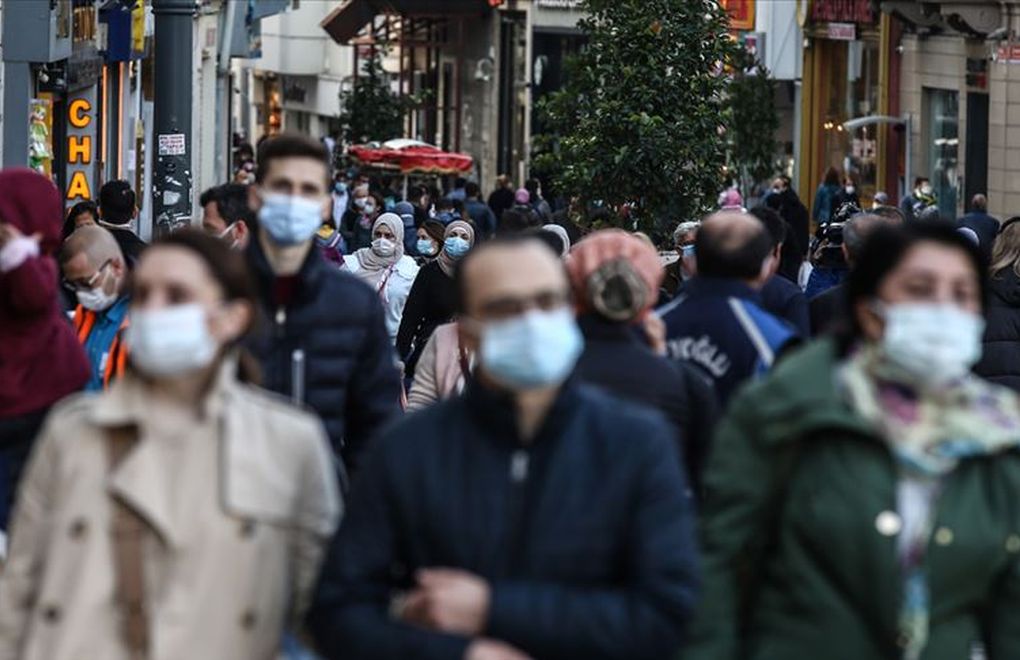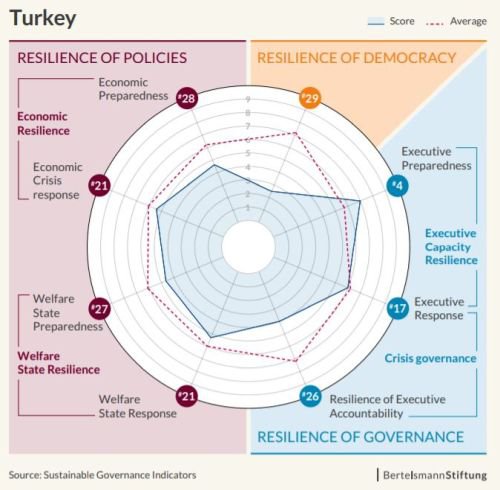* Photo: Anadolu Agency (AA)
Click to read the article in Turkish
The Germany-based Bertelsmann Foundation has recently released a report titled "Just How Resilient are OECD and EU Countries? - Sustainable Governance in the Context of the COVID-19 Crisis."
Prepared by Christof Schiller, Thorsten Hellmann, Helene Schüle, Sascha Heller and Emma Gasster, the report has shown that "well-organized democracies are better at navigating the pandemic."
The international study set out to compare 29 countries of the Organization for Economic Co-Operation and Development (OECD) and European Union (EU) to find out how well equipped they are to cope with the crisis. Sweden, New Zealand and Germany have topped the list while Greece also ranks high. Poland, Hungary and Mexico have ranked at the bottom.
Turkey ranks last in democracy, media freedom
When Turkey is considered, the country has ranked 29th out of 29 countries in terms of resilience of democracy and media freedom.
The report has commented:
In Turkey, the scope of media freedom had already been dramatically diminished before the pandemic. Political actors there exert significant influence over the media landscape, both directly and indirectly. Journalists critical of the government are arrested, and penalties are imposed on opposition radio and television stations; both actions are significant violations of press freedom.
When the resilience of governance is considered, Turkey has ranked 21th out of 29 and it has ranked 25th in terms of welfare state resilience.
The overall ranking on economic resilience is led by Germany, Sweden, Switzerland and Denmark. The bottom group is made up of Poland, Croatia, Hungary, Chile, Turkey (27th), Italy and Mexico.
"Both with regard to their vulnerability to crises and their economic-policy crisis response, these countries show the greatest shortcomings in terms of economic sustainability," the report has commented.
Comparing Turkey with other countries within this context, the report has briefly shared the following observations:
"In Turkey, Hungary, Mexico and Croatia, efforts to hollow out key democratic institutions have only continued during the crisis.
"In addition, the pressure placed on media professionals increased significantly in these countries.
"The ability of the courts to monitor the legality of measures taken by these state's governments has also been curbed even further.
The state of civil and political rights has also worsened in Hungary and Turkey, where governments exploited the coronavirus crisis to introduce tighter restrictions.
"An important measure of the quality of a country's democratic culture is the ability of its political leadership to engage in compromise.
"In 10 of the countries we surveyed, political polarization posed a significant obstacle either within the policymaking process or later in the coordination and implementation of key crisis-response measures.
"In Belgium, Estonia, France, Spain, Turkey, Israel, Poland, Hungary, Mexico and the United States, failures to bridge partisan divides slowed progress in controlling the pandemic."
Chapter on TurkeyThe report's full observations about Turkey are as follows (pp. 139-140): "Turkey ranks 25th among the 29 countries on resilience of policies scoring 5.00 out of 10. This historic crisis undermined the country's already broken democratic norms and institutions, with Turkey ranking 29th (score: 2.50). The authoritarian tendencies of the government under Recep Tayyip Erdoğan reached a zenith following the failed coup in 2016, culminating in the transition to a presidential system in 2018. The Erdoğan administration's crisis governance places Turkey 21st (score: 5.67). "The Turkish healthcare system mounted a swift response to the first wave of the pandemic, largely containing transmission. The country's healthcare infrastructure and intensive-care personnel enabled the government to manage the first months of pandemic. With the relaxation of restrictions in June 2020, however, Turkey entered a more severe second wave, which challenged the healthcare system. As of mid-March 2021, the cumulative infection rate was 3,414 per 100,000 (rank: 9th), but excess mortality averaged 20.96% in 2020 (rank: 28th). "With regards to vaccine development, Turkey has lagged behind similar-sized economies. The government's agreements with vaccine manufacturers have also been insufficient to rapidly immunize the Turkish population. "Even before the pandemic, Turkey's labor market was characterized by high unemployment, low wages and a large informal sector. The government responded to the COVID-19 crisis on March 18, 2020 with a package of economic interventions, including a one-time cash transfer to millions of households and reinforcement of the short-term work allowance. These interventions, however, were smaller in scope than needed. Unsurprisingly, the pandemic further undermined Turkey's already fragile labor market. Overall, social welfare interventions largely failed to protect socially disadvantaged groups, including refugees. "The country's recent transition to a presidential system has centralized power, which during the pandemic enabled the Erdoğan administration to regulate by presidential decree rather than through legislation. Government ministries rapidly implemented policy measures, though coordination problems emerged with the distribution of face masks. A board of scientific experts was formed to advise the government two months before the first diagnosed case of COVID-19 in the country. Beyond this advisory board, public consultation has largely been limited to pro-government actors. "The Erdoğan administration counterproductively attempted to exclude mayors of the country's largest cities, including Ankara and Istanbul, which had been won by opposition parties in the 2019 local elections, from pandemic coordination meetings between national and local governments. In addition, government authorities are suspected of manipulating official statistics on COVID-19 infections and related deaths to serve the ruling political party's interests." |
(RT/SD)






